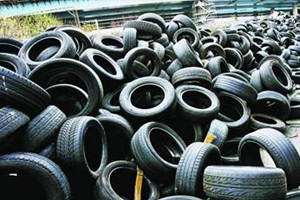Over 1 million cars are still being illegally scrapped every year
 As many as a million tyres a year have been dumped on Central Belt waste ground since 2004.
As many as a million tyres a year have been dumped on Central Belt waste ground since 2004.There are millions of them.
They are noxious, polluting, a haven for rats – and they have been dumped all over Scotland by waste cowboys.
The illegal fly-tipping of old vehicle tyres is one of the nation’s biggest environmental problems. But the tippers are now facing a crackdown by the Scottish Environment Protection Agency (Sepa), which is determined to catch “dumb dumpers”.
As many as a million tyres a year have been dumped on waste ground in the Central Belt since 2004. More than five thousand illegal dumping incidents have been reported, many in the west of Scotland.
As well as being a blight on the landscape, dumped tyres are dangerous. They encourage insect and rodent infestations, and are a major fire risk.
Piles of tyres are often set alight and have to be put out by the fire services, sometimes with great difficulty. And when they burn, tyres produce a toxic cocktail of pollutants that can contaminate water, land and air.
If the polluted air is inhaled, it can cause major public health problems for nearby communities. The pollutants are particularly harmful for those with breathing difficulties.
Sepa has been running major campaigns against tyre dumping in Glasgow, Lanarkshire and West Lothian. Cleaning up the dumps is time-consuming and expensive, the agency says.
In an operation codenamed Operation Aspen, hundreds of visits were made last autumn to garages and other vehicle businesses to remind them to ensure their tyres are disposed of responsibly by registered waste companies.
Some old tyres can be retreaded and reused. The rubber can be recycled into soft surfaces for play areas or tennis courts, or put to various industrial uses. Tyres can also be burnt in incinerators to produce energy, though this can be controversial.
Sepa’s waste and enforcement manager, John Kenny, told the Sunday Herald investigators were to continue building on Operation Aspen by gathering intelligence on dumpers.
“Sepa will also determine whether similar type operations should be undertaken in other geographical areas,” he said, “and whether this type of intelligence-led regulation can be rolled out to other areas of our regulatory work.”
Figures from North Lanarkshire Council show that the weight of waste tyres picked up by the council in 2009-10 was 57 tonnes. As well as triggering a successful prosecution for fly-tipping tyres, the council has also invested in CCTV surveillance to catch dumpers.
“We are cutting the supply of old tyres from garages, restricting access to sites where they can be dumped and making it known that we will take direct action to prosecute the people who carry out this crime,” said the council’s environmental health manager, Andrew McPherson.
The Scottish Flytipping Forum, which was set up to co-ordinate tackling the problem across the country, runs a “Dumb Dumpers” campaign encouraging members of the public to report problems by calling 0845 230 40 90, or by using the online report form atwww.dumbdumpers.org.
Sorting the chancers from the champions
In a bid to better target its regulation of polluters, the Scottish Environment Protection Agency (Sepa) has turned to alliteration, specifically to the letter ‘C’.
It is dividing the thousands of companies and plants that it has to deal with into six categories: criminals, chancers, careless, confused, compliant and champions.
Sepa stresses that most operations – maybe 70% – are champions who are doing the best they can to cut waste and pollution. And it is promising to hit hard the five per cent or so who are chancers or criminals – like tyre dumpers.
However, because its resources are being reduced like other public sector organisations, it is planning to cut the cost of regulating the majority of facilities that perform well.
“We have to live within our means,” said Sepa’s chief executive, Campbell Gemmell.
“Our old business model was bust,” he told the Sunday Herald.
“In the current circumstances, the pick and fix model is where we have to focus our efforts.”
Last week the Sunday Herald revealed pollution checks at thousands of factories, waste plants and small businesses were to be slashed by Sepa to save money. Inspections of most 1900 small enterprises are to be reduced from twice a year to once every three years. Visits to most of the 1300 sites licensed for waste management will be cut by a third, a half or more.
Mr Gemmell argued Sepa’s attempt to focus on the criminals and chancers needed to be backed up by a better enforcement policy for environmental offences. The light sentences often given to polluters needed to be toughened up, he said.
On April 1 a Fife scrap metal merchant, Henry Gray & Sons, pled guilty at Kirkcaldy Sheriff Court to breaching its waste management licence by leaving dozens of scrapped cars to leak oil, brake fluid and coolant into the ground. But the company was not fined for the offence, merely admonished.
Rob Edwards, Environment Editor
You can return to the main Market News page, or press the Back button on your browser.

